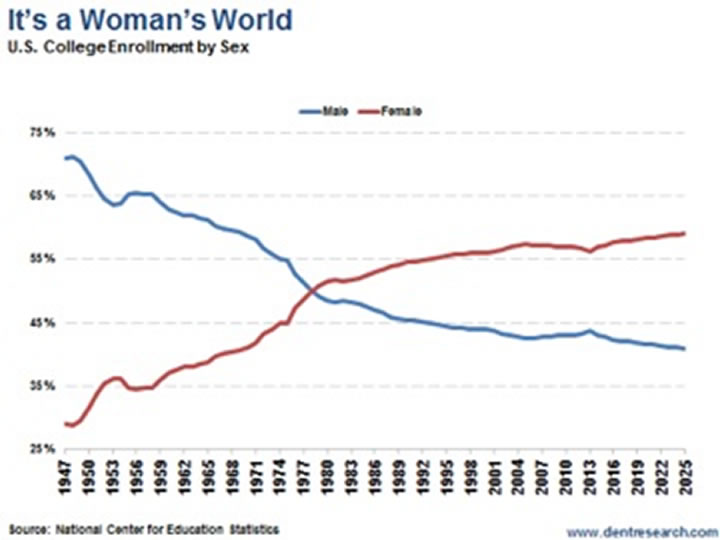The Influx of Female Professionals is Changing Consumer Spending
Economics / Demographics Aug 30, 2016 - 05:22 PM GMTBy: Rodney_Johnson

 I recently dropped off my youngest at college for her freshman year. She’s finally free of the prison rules of high school, and can explore life as a young adult. I’ve given her a few pointers. OK, maybe a few thousand tips on what to do and what to avoid over the next four years.
I recently dropped off my youngest at college for her freshman year. She’s finally free of the prison rules of high school, and can explore life as a young adult. I’ve given her a few pointers. OK, maybe a few thousand tips on what to do and what to avoid over the next four years.
I think I’m qualified. Her two older siblings are navigating college life just fine, with no police records and their online dignity still intact. I’m sure our parental guidance had a lot to do with this… or at least a little something.
However, there’s one area of life where I’m stumped. I can help with financial education, and picking classes, and I can even provide a little insight on selecting housing (off-campus, but adjacent property, is the bomb!). But when it comes to affairs of the heart, I go silent.
While I’d love for her to find a young man with vast earning potential, undying love and respect for her, and a healthy fear of her parents, these aren’t easy characteristics to tease out of texts and the occasional conversation. I have to trust that she’s developed her own judgment in this area, and hope that things turn out for the best. About all I have to offer on this subject is: “Keep your eyes open!”
Unfortunately, the deck is stacked against her, and things are getting worse.
I was lucky enough to meet my wife in middle school. Yes, you read that correctly, middle school. My family moved often and my eventual bride and I attended different colleges. We dated off and on for a decade, and wed in our early 20s. That experience is highly unusual, to say the least.
Most college graduates meet their spouses after high school, with many making connections at university, which stands to reason. Kids going to college share an interest in continuing their education. Beyond that, they are free to seek out clubs and activities, presumably meeting like-minded people along the way. This seems like the perfect environment for identifying potential life partners.
Compare that with days at work.
When my daughter eventually finds herself in the workaday world, chances are she’ll take a job that employs a small group of people near her age with varying backgrounds. There will be employees older than her, and in the following years other groups younger than her. Among the rank and file will be married people and singles. In the span of a summer she will have moved from a veritable ocean swimming with available fish to a pond with just a few prospective guppies.
I’m not caught up in the idea that my daughter, or anyone for that matter, must seek out a person at least equal to her own intelligence and personal motivation. If those were criteria for marriage it would be a strange, stratified world! But I do want her to find a spouse and have all the joy and life benefits that come with marriage.
Her prospects are best while in college, but the competition’s getting fierce.
The National Center for Education Statistics (NCES) reports that in 1947, 70% of college students were male. By 1978, there was an even split between the sexes. After that, the growth rate of female students slowed a bit, but it didn’t stop. Every year, more women went to college than men.
Today, a full 57% of college students are women.

The NCES expects the gap to widen further over the next several years.
But of course, this goes beyond my daughter’s romantic prospects. The growing gender inequality among college students and graduates will affect our economy as a whole.
The change won’t be immediate, but over time there will be fewer men to fill professional roles throughout the nation. More of the posts requiring a college degree will be filled by women.
I’m not saying that’s good or bad. It just is. In a politically correct world that seems bent on curing every numerical ill, it’s interesting that this one receives so little attention.
But there are some clear repercussions in our economy.
As women fill more professional roles, they wait longer to have children, which pushes out the family formation cycle and changes consumer spending. Young, childless professionals still spend money, but they aren’t locked into spending in the same way as young families.
The good news is that the desire for children among young professionals doesn’t seem to have waned. We still expect more children in our economy, and all the required spending that comes with them. The only question left is where young couples will meet, given that colleges are so far out of balance.
Rodney
Follow me on Twitter ;@RJHSDent
By Rodney Johnson, Senior Editor of Economy & Markets
Copyright © 2016 Rodney Johnson - All Rights Reserved Disclaimer: The above is a matter of opinion provided for general information purposes only and is not intended as investment advice. Information and analysis above are derived from sources and utilising methods believed to be reliable, but we cannot accept responsibility for any losses you may incur as a result of this analysis. Individuals should consult with their personal financial advisors.
© 2005-2022 http://www.MarketOracle.co.uk - The Market Oracle is a FREE Daily Financial Markets Analysis & Forecasting online publication.


